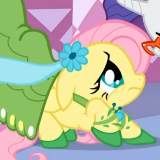Grammer a Week 9: That vs. Which · 10:29pm Apr 3rd, 2015
This is Grammer a Week, the periodic blog program-thing where I address a frequently broken grammar rule and tell you how to fix it. This week's installment is about that vs. which. This is probably an error that has caught you a few times in Microsoft Word. At least, that's how I was first informed of this error! So what's the differences between these two words? It actually underscore a far more complicated and important subject that needs some discussion: the difference between restrictive and nonrestrictive clauses.
Restrictive vs. Nonrestrictive
First off, to define what the difference is between these two terms. Put simply, a restrictive clause is one that must be included in a sentence for it to make sense. Conversely, a nonrestrictive clause in one that may be removed from a sentence with no real loss of meaning:
Twilight, who had a few strands of her mane sticking out, groaned in frustration.
The mare who had a rainbow mane left a Sonic Rainboom in her wake.
In the above case, the first example is a nonrestrictive clause, and the second is a restrictive clause. See that in the first case, you could remove "who had a few strands of her mane sticking out" and the sentence would still retain all its information; the pony in question is still Twilight, and she's still stressed. On the other hoof, the second example is restrictive: the clause in question is "who had a rainbow mane," and this clause cannot be removed from the sentence without a loss of information:
The mare who had a rainbow mane left a Sonic Rainboom in her wake.
The mare left a Sonic Rainboom in her wake.
In the first example, it's clear that the pony is Rainbow Dash, but in the second, it theoretically could be any mare.
Also note how nonrestrictive and restrictive clauses tend to be constructed. Note that nonrestrictive clauses are always set off with a pair of commas, but restrictive clauses are never set off with commas. These commas are quite important, as they change the restrictive status of a clause, and can, in fact, change the meaning of the sentence as well:
The air was filled with dozens of flying creatures. The breezie, who was blue, had trouble coping with the air currents, however.
The breezie who was blue had trouble coping with the air currents, however.
The first example contains a nonrestrictive clause. In that case, "who was blue" is considered nonessential information, and no meaning would be lost if it was taken out. "The breezie" is enough information to identify the subject. The second example, however, contains an essential restrictive clause. All of "[t]he breezie who was blue" is required to identify the subject. The second example implies that there may be other breezies in the air who are not blue, but the first example does not.
That vs. Which
Now on to the difference between these two words. The rule is simple (which is why Microsoft Word can pick it up so easily). "That" is used exclusively for restrictive clauses, and "which" is used exclusively for nonrestrictive clauses:
The flying carriage that was white was pulled by four pegasi. The taxi cab, which was yellow, however, was pulled by a single earth pony.
In this example, the first sentence has the restrictive clause, hence why "that" and no commas were used. The second sentence has the nonrestrictive clause, hence why "which" and a pair of commas was used. The way the words work, an easy hard and fast rule can be established: use commas with "which." It's that simple.
Thanks for reading! If you have any questions or comments, please post them below. I'm always open to suggestions for future Grammer a Week posts.


